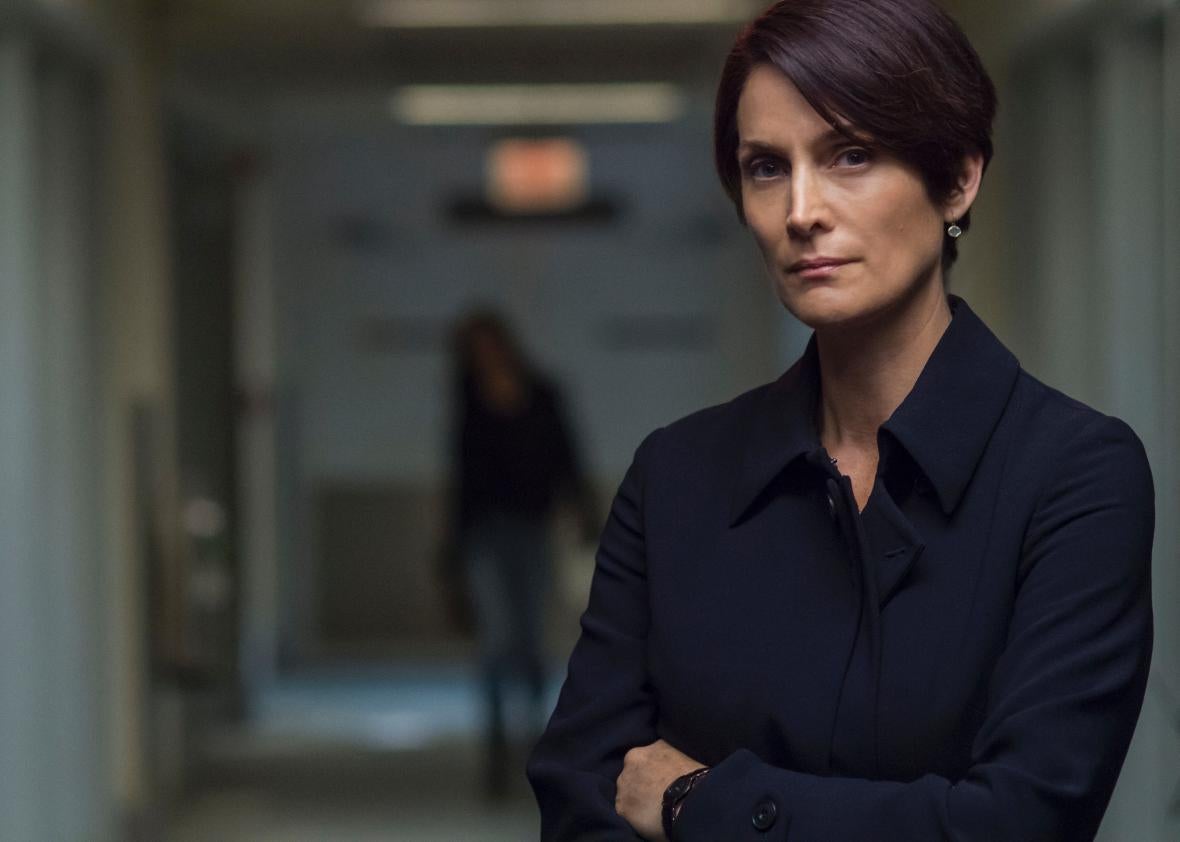Netflix’s new series Jessica Jones has many things going for it: Krysten Ritter is electrifying as a cynical, booze-soaked sexual-assault survivor with superstrength and a devastating sense of humor. David Tennant is absolutely creep-tastic as a psychopath who can compel people to do his bidding, no matter how bizarre his instructions. It’s a serious, nuanced look at PTSD, female friendship, and the essential weirdness of the “caring professions,” which so often seem to involve damaged people meddling in the lives of total strangers. It also represents Marvel’s first look at lesbian divorce.
The lesbians involved are Jeri Hogarth (Carrie-Anne Moss)—a bad-bitch defense attorney who is so dour and focused on her work we’re told she was on the phone with clients all through her honeymoon—and Wendy Ross-Hogarth (Robin Weigert), a physician who put her wife through law school, then used the income from her law practice to subsidize her work in low-income clinics. Their parting is far from amicable. Hogarth has fallen for her secretary, the lovely Pam (Susie Abromeit), whose entire wardrobe consists of cleavage-revealing wrap dresses. It’s a story as old as capitalism—the more career-focused partner in a marriage trades in the old wife when a younger, more worshipful model shows up in the workplace—but now everyone in the triangle is female.
Hogarth calls upon Jessica Jones, who runs a Veronica Mars-like PI firm, to dig up dirt on her ex, because the good doctor won’t sign divorce papers. Wendy still loves Hogarth and is convinced she’s going through a midlife crisis that could pass at any moment. But Hogarth needs the divorce papers signed immediately, if not sooner, because Pam has gone full Lysistrata on her, withholding sex until they’re married. It’s a mess but also a certain kind of progress: You know we really do have marriage equality when even Marvel can do a sordid lesbian divorce storyline.
There’s nothing homophobic in the portrayal of Hogarth. Sure, she’s a cad who’s so desperate to get it on with her new lady that she puts an ethically compromised, corner-cutting, superpowered PI on the case. But there’s none of the old, anti-lesbian stereotypes at work here—instead it’s a story that’s been written over and over about successful men. It’s also pretty great to see lesbians portrayed as sexual beings whose relationships are treated with total seriousness by everyone they meet.
Of course, this being a Marvel production—albeit, as Jack Hamilton wrote last week, one that is “more genuinely adult than anything Marvel has produced to date”—the divorce story quickly slips the surly bonds of realism. Since I know some readers won’t have watched the entire season yet, I won’t spoil what happens. Suffice it to say that by the end of Episode 13, the Jeri-Wendy-Pam triangle is in a different shape than it was at the beginning of Episode 1—but there’s nothing that resembles resolution, much less happily-ever-after.
That lack of resolution is part and parcel of the comic book style of storytelling. Comic books work very much like soap operas: Since the idea is to keep them going forever, stories are always in motion—if every thread were tied up, that would be the end of the comic. It’s good to know that Hogarth’s love life will be an element in Season 2. I just wish I didn’t have to wait so long to learn what happens next.
This vague feeling of dissatisfaction at the way the lesbian divorce plot was handled is enhanced by the Netflix model of releasing entire seasons in one giant gift-wrapped package. The Hogarth triangle seemed, based on the traditional TV measures of number of minutes and expensive actors devoted to the storyline, to be an important one, and yet it would disappear for hours at a time. Robin Weigert might not be a household name, but she’s too big to show up for two minutes of yelling every few episodes. On broadcast television, I suspect viewers would have griped if they’d tuned in every week and rarely got a fix of lesbian divorce drama; on Netflix, a frustrated viewer could just hit “Play Next Episode”—though in this case that still wouldn’t bring the resolution they desired.
Jessica Jones’ slow, patient storytelling method is what allowed the lesbian divorce plot to feel real—major life events tend to play out in fits and starts rather than in convenient 44-minute bursts. But the comic book world’s need to keep a few storylines unresolved means that I have to wait a year to find out if Hogarth will find happiness. Marvel may have had its first lesbian divorce plot, but viewers have not yet had our first satisfactory lesbian divorce plot!
